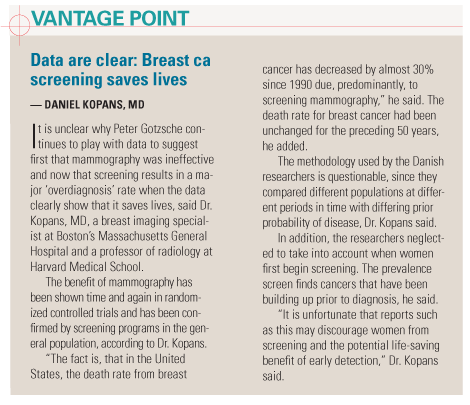Study claims screening mammo encourages overdiagnosis
A prominent Danish researcher is continuing to question the value of screening mammography, reporting that one in three breast cancers is overdiagnosed.
A prominent Danish researcher is continuing to question the value of screening mammography, reporting that one in three breast cancers is overdiagnosed.
Some lumps in the breast will not develop into full-blown cancer, remaining harmless and asymptomatic. Overdiagnosis, which leads to the treatment of these harmless findings, is a detriment both to the patient’s health and her pocketbook, the study contends.

Peter Gotzsche, MD, director of the Nordic Cochrane Center in Copenhagen, Denmark, and colleague Karsten Jorgensen, MD, analyzed breast cancer trends before and after the introduction of public screening in the U.K., Canada, Australia, Sweden, and Norway (BMJ 339:b2587, 2009).
The data covered seven years before and seven years after screening began. The researchers estimated overdiagnosis rates of 57% for the U.K., 59% for Canada, 53% for Australia, 46% for Sweden, and 52% for Norway.
Dr. Gotzsche’s criticisms of mammography are nothing new. Nearly a decade ago, he questioned the mortality benefit from mammography screening, concluding that for every 1,000 women screened biennially throughout 12 years, just one breast cancer death is avoided (Lancet 355:129-134, 2000).
In 2006, Dr. Gotzsche reported that for every 2,000 women invited to join a screening program over 10 years, just one would have her life prolonged. Another 10 healthy women would be diagnosed as having breast cancer and referred for unnecessary treatment (Cochrane Database Syst Rev 4:CD001877, 2006).
With the current study, Dr. Gotzsche continues his critique of screening mammography.
“It is unlikely changes in risk factors or cohort effects could explain the nonlinear increases in incidence of breast cancer that occurred with the introduction of screening,” Dr. Gotzsche wrote.